Editor’s note: When Abhinav Suresh reached out to me in June before his trip to Madrid for the Candidates, I was more than happy to connect him to match organizers and have him on-site on behalf of US Chess. I know what a thoughtful and intelligent writer Suresh can be, and I also know his deep love for, and growing strength, in our beloved game.
Over the span of more than a week, “our man in Madrid” witnessed some dramatic chess, talked to players, reporters, and fans, and fed information back to us here in the States for our coverage. He also wrote this wrap-up of his time in Madrid. Consider it your weekend read, and your inspiration to get out and see the world.
For more on what happened at the next stop in Suresh’s European adventure, check out his “My Best Move” contribution to our September issue of Chess Life.
Earlier this month, I left my job in the New York financial world to pursue a new opportunity. While I was apprehensive about moving on, the prospect of a new challenge — a new start, a “day one” — was too much to turn down.
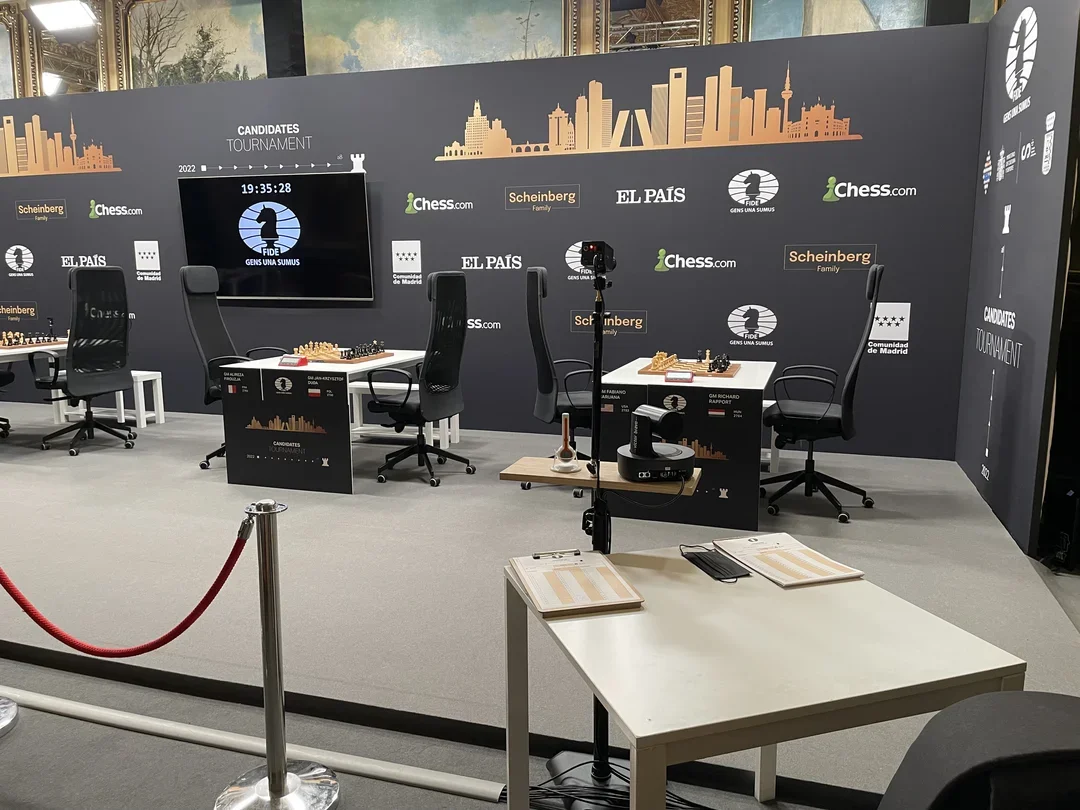
Arriving in Madrid, where I was visiting before beginning my new job, “day one” was really “day three.” After a delayed plane and a mishap with a SIM card, I picked up my credentials at the Palacio de Santona. As it happened, I only managed to catch the tail-end of the most exciting game of the day, Firouzja versus Nakamura.
It didn’t matter that I had come in late. The energy, despite the hour, was palpable. I checked out the main Spanish commentary booth, coordinated by GMs Jose Rafael Gascón Del Nogal and Miguel Santos. The antechamber was filled with press and spectators, eagerly analyzing the earlier games of the round and energetically kibitzing despite having done so all day. On the other half of the room, Chessable and Chess.com representatives were joining in on the fun, calling out moves and engaging in blitz games whenever their honor was challenged.
Suddenly it hit me. This is what I missed. Not just the games, but the fun. Chess, for me, had always been a brutal sport. The last time that I focused on the game, improvement had been my primary concern. I was afraid that upon my more serious re-entry, despite (or perhaps because) my conscious de-emphasis of rating advancement, it would lose the initial luster that the game once had.
Here, the atmosphere was intense. You could see it on the candidates’ faces, on the livestream and even more so in person — but all around, it was also filled with levity and enjoyment. I had expected a more somber event, filled with stony-faced organizers, frantic media, and serious enthusiasts. How wrong I was!
Over the next few days, I was shocked at how much the atmosphere would vary, almost by the hour. After round five, when Hikaru drew the tournament leader Nepomniachtchi, I saw the players leave in disgust before I could fumble to take their pictures. That same day, I spent a few minutes chatting with a visibly exhausted Richard Rapport, who quipped “These kinds of games aren’t good for my health.” And the day before, a disappointed Ding Liren replied “No, not a good game,” after I congratulated him on his spirited effort against the leading American, Fabiano Caruana.
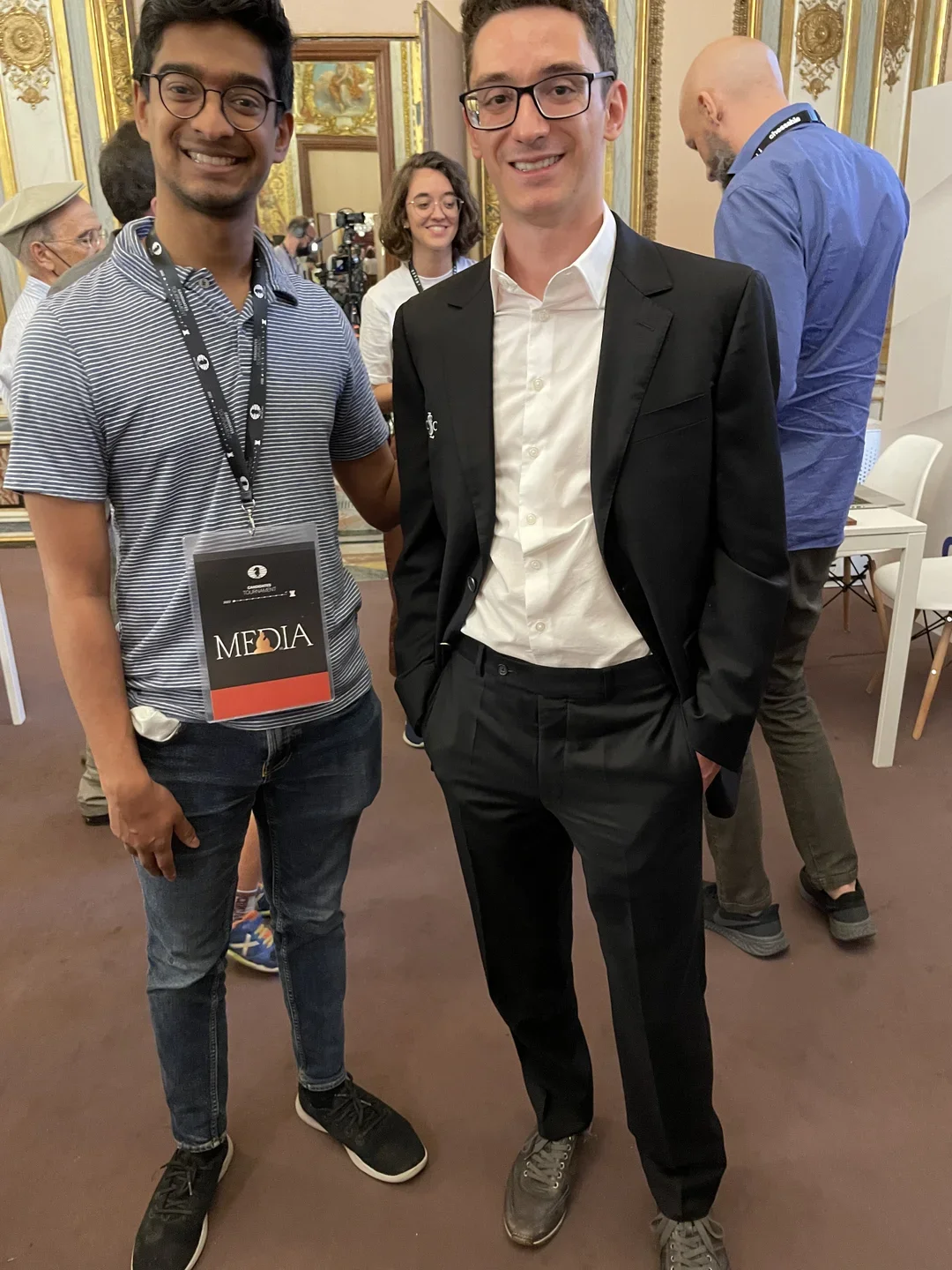
As a former competitor, I understand. These players are at the very top of their fields, and they expect (to some extent) nothing less than perfection. That, in essence, is the standard required to win the Candidates, not to mention a potential (if not, in the end, actual) world championship match against the indomitable Magnus Carlsen.
Perhaps what surprised me most was the sheer kindness I experienced. Both Caruana and Nakamura exchanging a few pleasantries with me after some of their “lighter” games showed me that behind their exploits over the board are two entirely normal people, willingly staying for pictures and autographs for fans.
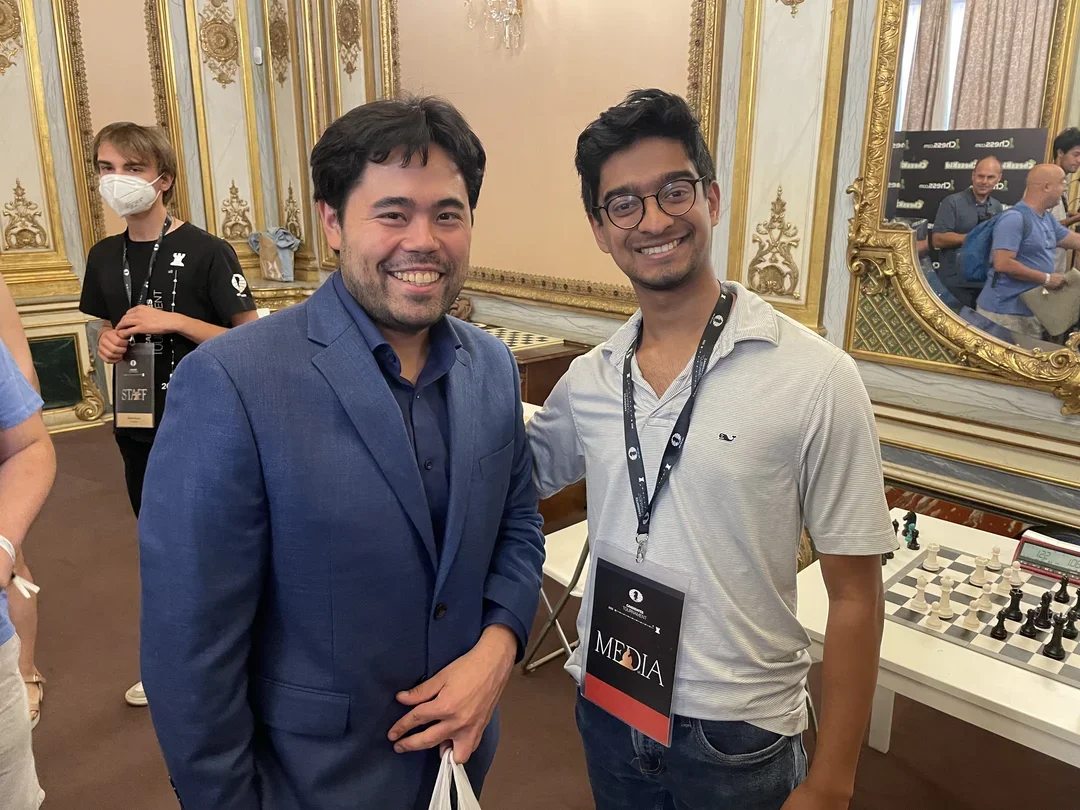
And it wasn’t just the Americans who were engaging. Ding was a consummate gentleman, saying few words, but almost always with a smile on his face. Firouzja, a fan favorite, seemed to be highly reserved, spending the vast majority of his time with his brother and father, but still happy to take a couple photos. Nepomniachtchi appeared to barely believe his luck after his round seven win over Rapport, breaking out the largest smile I’ve ever seen from him, in-person or online. Jan-Krzysztof Duda was quiet, but self-assured in his skill, he travelled with a cool confidence regardless of results. Teimour Radjabov impressed with his wittiness in his interviews with Dina Belenkaya. Despite his poor performance, he seemed to gain the most favor with the crowd by the mid-way point of the tournament.
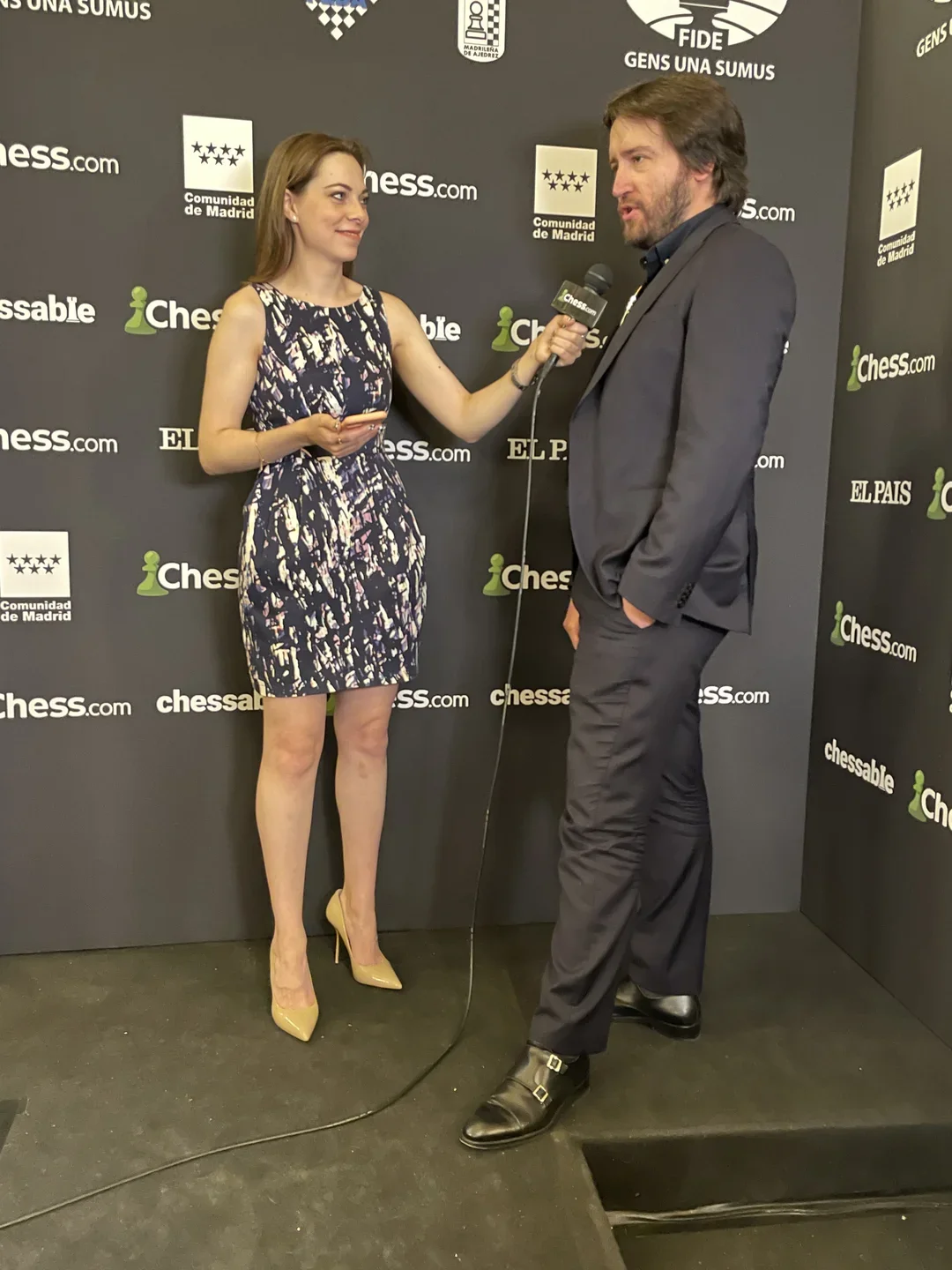
The other characters surrounding the tournament — the talented crew members of the press — were nothing but friendly to this outsider. As the tournament dragged on, I saw no wavering in their dedication to pursuing excellence in reporting, documenting, and glamorizing chess for a diverse, global audience
The tension ratcheted up in rounds eight and nine, with a dramatic win by Nakamura over Caruana among the key results. Desperate for a win against the tournament leader Nepomniachtchi, Caruana went for an aggressive sideline in the Petroff the next day. The tension was palpable – every media member speculated endlessly on the repercussions of the round and games, and how a win by Fabiano would set the pace for a thrilling nailbiter in the final rounds.
After Caruana collapsed in the later rounds, and Nepomniachtchi continued to grow his lead, the mood changed again. Earlier in the event, the players seemed to beat themselves up for every minor inaccuracy. Even Nakamura, after thrashing Caruana in round eight, berated himself for making his task harder despite the result. Players often skipped the press conference in the games that they lost, visibly disgusted with their own play.
But after it became clear that Nepomniachtchi would be the challenger, every player seemed to loosen up a little — except for the Russian. Though he clinched tournament victory with a round to spare, I was decidedly impressed when he was asked how he felt – “There is still one more game to go,” he said, “and I don’t want to spoil my own party.”
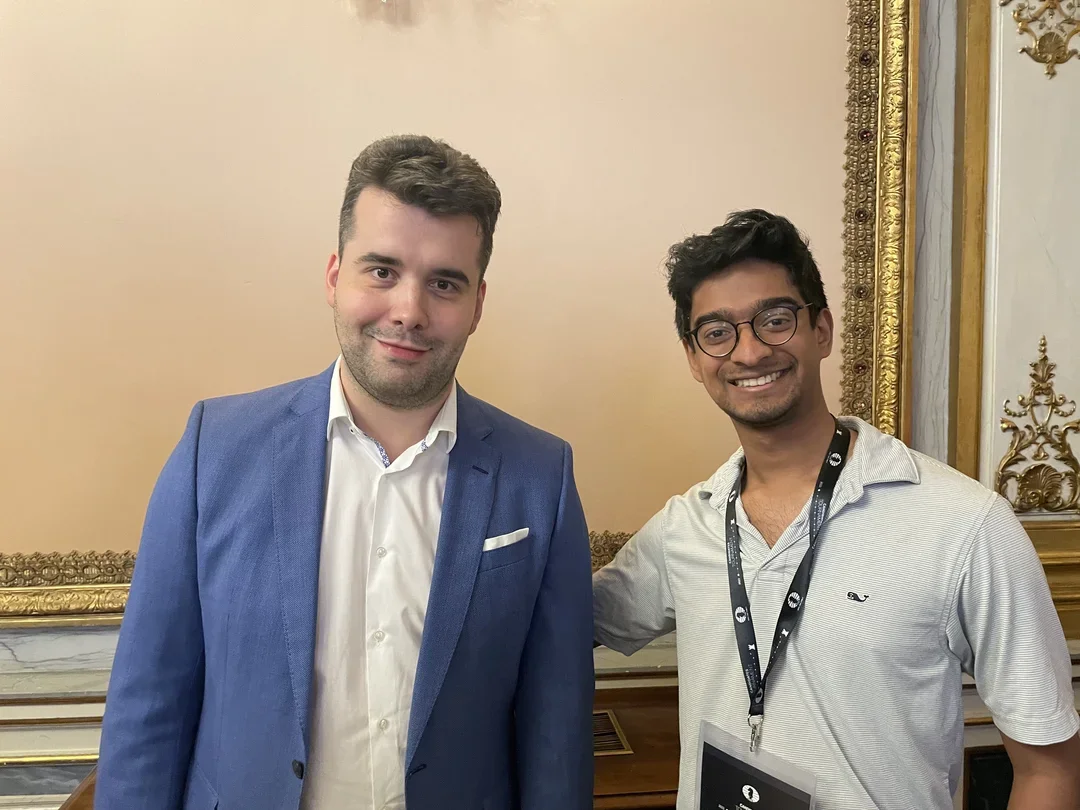
I couldn’t help but be awed by these words, and there is nothing more befitting the phrase “champion mindset” than the attitude I evinced in that interview. Though I had often went down to the skittles area in the venue for a few games against other players, I didn’t really feel the need to improve my own game until I witnessed that moment.
I played a series of G/3+2 games against a couple of strong journalists. While I was evenly matched in terms of rating with many of them, I was shocked — and frustrated! — by my woeful play. I went a dismal 2/8 against a player who I could feel was not any stronger than myself. A half-decade of tournament inactivity and a years-long bullet-chess addiction had rotted my calculation ability. I’m reminded of a phrase that poker players use to disparage online play — they call it “button-clicking.” And indeed, that is all I had invested into my chess education during my second half of college and entirety of my first job.
No longer. I now have more time to dedicate to chess; what could I possibly be waiting for? The Candidates was supposed to be a mere vacation for me, something for me to do around so I could feel involved in chess, even if I weren’t working on my own game. I can’t justify that now. That craving to win and improve is back, and I missed its sometimes-bitter feeling.
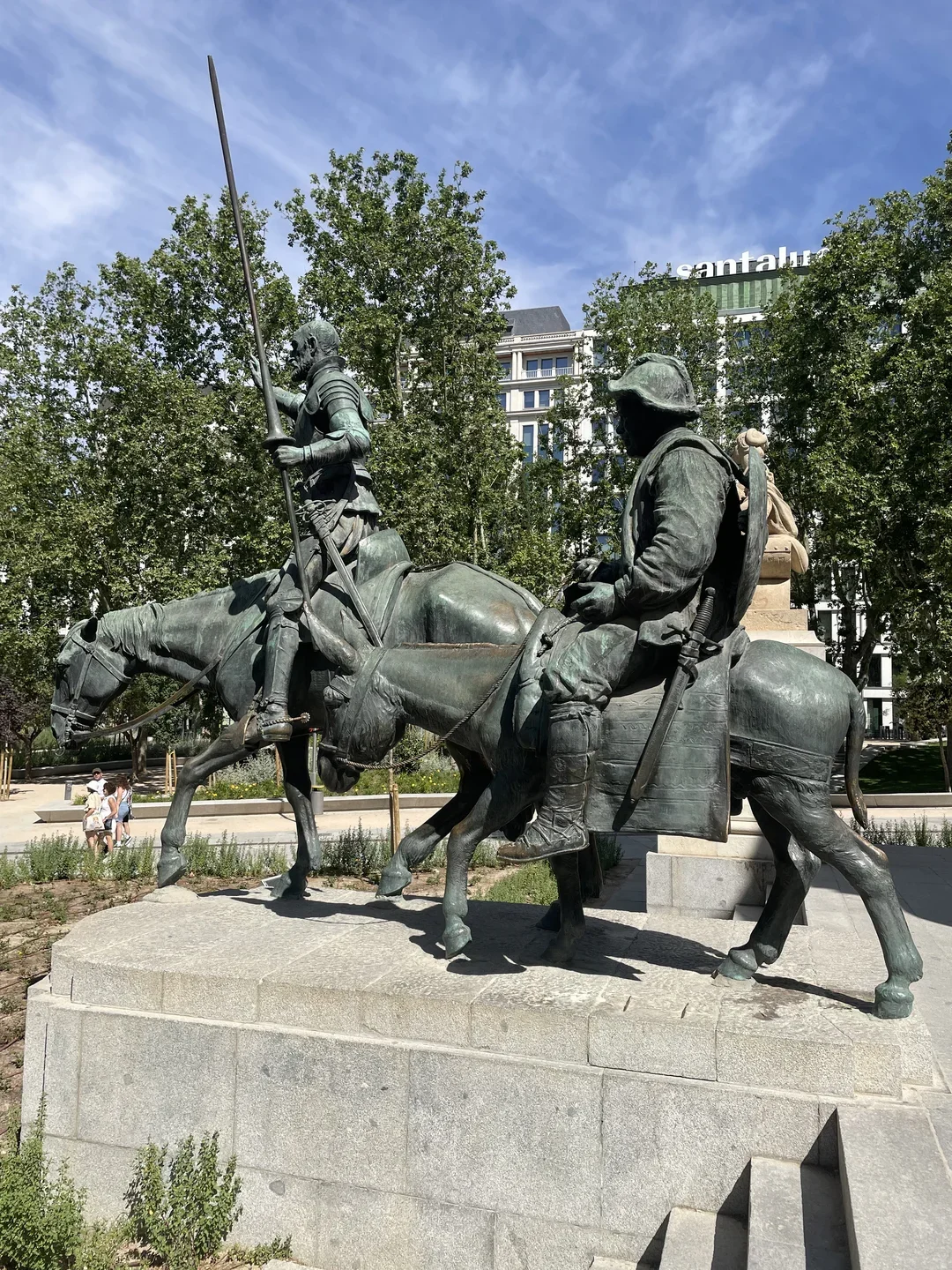
I came to realize that I had been using the scourge of online chess to prevent me from really working on my own game. Only by turning the online off – by staying, watching the commentators, and analyzing lines with other strong players – was I able to improve my overall understanding. Indeed, even by the end of the tournament, I could feel my calculation ability slowly return, my understanding of motifs beginning to crackle in my fingers once more.
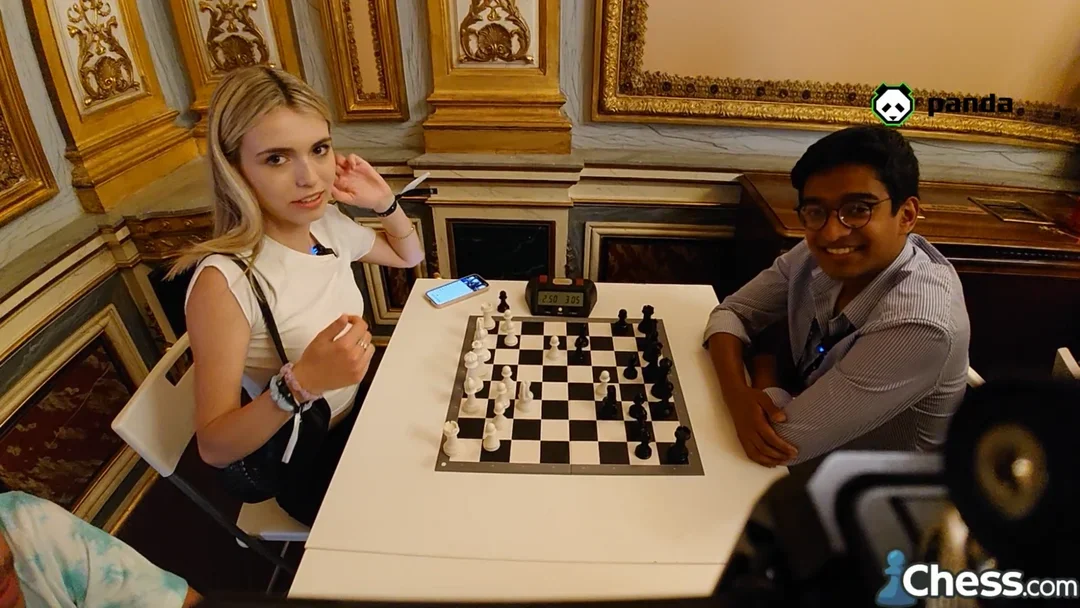
Of course, I had fun. And that was the main reason that I had come in the first place. I met the incredibly popular streamer Anna Cramling, playing her in a pair of blitz games (both losses – both from better positions!) as we discussed how to improve. Rey Enigma – the masked chess player from Madrid – made an appearance on the last day of the Candidates, and he was all too happy to take down my regular sparring partner in a beautiful game.
Magnus Carlsen himself made a surprise appearance during the penultimate round, giving me sour face when I asked him for a picture for US Chess. In comparison to the camaraderie I had grown used to, this entire experience was almost comical – from his contorted sneer to my immediate, unbidden laughter, so incredulous was I at his aloof behavior.
But no matter. I had met every single player at the tournament multiple times, and each one (save the champ) was kind and gracious. GM Nikita Vitiugov, making a surprise appearance to support Nepomniachtchi, was one of the friendliest players I had ever met, replying “one day!” when I told him I would love to see him in the Candidates in the future.
I’m bringing a lot back from Madrid. There are photos, contacts, memories. But most of all, I am eager to get behind the board — and the books! — in order to improve my own game. I have been chasing the title of “expert” for far too long. While it might not come easily, or (alas) even quickly, I suspect that I’ll have my time at the Candidates to thank one day when it does.
Categories
Archives
- January 2026 (1)
- December 2025 (27)
- November 2025 (29)
- October 2025 (39)
- September 2025 (27)
- August 2025 (29)
- July 2025 (43)
- June 2025 (25)
- May 2025 (24)
- April 2025 (29)
- March 2025 (29)
- February 2025 (20)
- January 2025 (24)
- December 2024 (34)
- November 2024 (18)
- October 2024 (35)
- September 2024 (23)
- August 2024 (27)
- July 2024 (44)
- June 2024 (27)
- May 2024 (31)
- April 2024 (51)
- March 2024 (34)
- February 2024 (25)
- January 2024 (26)
- December 2023 (29)
- November 2023 (26)
- October 2023 (37)
- September 2023 (27)
- August 2023 (37)
- July 2023 (47)
- June 2023 (33)
- May 2023 (37)
- April 2023 (45)
- March 2023 (37)
- February 2023 (28)
- January 2023 (31)
- December 2022 (23)
- November 2022 (32)
- October 2022 (31)
- September 2022 (19)
- August 2022 (39)
- July 2022 (32)
- June 2022 (35)
- May 2022 (21)
- April 2022 (31)
- March 2022 (33)
- February 2022 (21)
- January 2022 (27)
- December 2021 (36)
- November 2021 (34)
- October 2021 (25)
- September 2021 (25)
- August 2021 (41)
- July 2021 (36)
- June 2021 (29)
- May 2021 (29)
- April 2021 (31)
- March 2021 (33)
- February 2021 (28)
- January 2021 (29)
- December 2020 (38)
- November 2020 (40)
- October 2020 (41)
- September 2020 (35)
- August 2020 (38)
- July 2020 (36)
- June 2020 (46)
- May 2020 (42)
- April 2020 (37)
- March 2020 (60)
- February 2020 (38)
- January 2020 (45)
- December 2019 (34)
- November 2019 (35)
- October 2019 (42)
- September 2019 (45)
- August 2019 (56)
- July 2019 (44)
- June 2019 (35)
- May 2019 (40)
- April 2019 (48)
- March 2019 (61)
- February 2019 (39)
- January 2019 (30)
- December 2018 (29)
- November 2018 (51)
- October 2018 (45)
- September 2018 (29)
- August 2018 (49)
- July 2018 (35)
- June 2018 (31)
- May 2018 (39)
- April 2018 (31)
- March 2018 (26)
- February 2018 (33)
- January 2018 (30)
- December 2017 (26)
- November 2017 (24)
- October 2017 (30)
- September 2017 (30)
- August 2017 (31)
- July 2017 (28)
- June 2017 (32)
- May 2017 (26)
- April 2017 (37)
- March 2017 (28)
- February 2017 (30)
- January 2017 (27)
- December 2016 (29)
- November 2016 (24)
- October 2016 (32)
- September 2016 (31)
- August 2016 (27)
- July 2016 (24)
- June 2016 (26)
- May 2016 (19)
- April 2016 (30)
- March 2016 (36)
- February 2016 (28)
- January 2016 (32)
- December 2015 (26)
- November 2015 (23)
- October 2015 (16)
- September 2015 (28)
- August 2015 (28)
- July 2015 (6)
- June 2015 (1)
- May 2015 (2)
- April 2015 (1)
- February 2015 (3)
- January 2015 (1)
- December 2014 (1)
- July 2010 (1)
- October 1991 (1)
- August 1989 (1)
- January 1988 (1)
- December 1983 (1)







